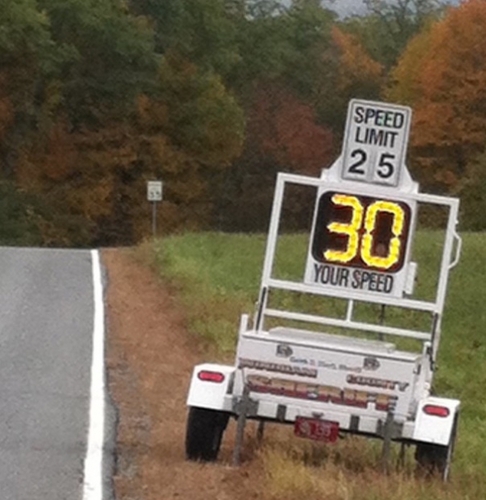WILLIAMSVILLE — When I'm driving down Main Street in Brattleboro, I wish pedestrians would cross at the crosswalk, and when I'm walking down Main Street in Williamsville, I wish drivers would heed the speed limit.
I've been wishing these things a long time.
My first-ever article for the first-ever issue of The Commons lamented the speeding in Williamsville. That was more than 500 issues ago.
If anything, the problem of people approaching 50 miles per hour through a 25-mile-per-hour village center has only gotten worse.
And not just in my tiny village, but in the even-smaller village of South Newfane and the larger village of Newfane on Route 30.
People don't just speed through Newfane Village on the state highway, they speed all along it.
Sometimes I even find myself pushing 60 in a 50-mile-per-hour zone. It's easy to do where the state highway approaches Interstate dimensions, with wide shoulders and clear straightaways. Yet regardless of a road's condition, it's a driver's responsibility to maintain - and not to exceed - legal speed.
* * *
Like the Abenaki people who lived here before them, the Europeans who came to Vermont in the 18th century traveled by foot. They established villages with mills, churches, schools, and cemeteries. The settlers subsisting on the outlying farms walked to have their grain ground, attend services, and bury their dead. Life was slower.
People still had significant fears for their safety, but being hit by metal machines hurtling along the public right-of-way was not among them.
The roads are public rights-of-way. We all contribute to their building and upkeep. They might be one of the few public efforts that everyone uses - and misuses. A road is possibly the one place where most of us also break laws enacted for our own safety.
Most of those laws pertain to vehicular traffic: Not just obeying the speed limit, but stopping at traffic lights and stop signs and giving bicyclists and pedestrians the right of way.
Some of those laws pertain to cyclists and pedestrians. Cyclists are supposed to follow the same rules of the road as motorists; pedestrians are supposed to cross at crosswalks. Whether there's a statute for walking facing traffic or not, it's a good idea. And wearing light-colored clothing and carrying a light from dusk to dawn helps motorists see a pedestrian at night.
In his book Leviathan, the 17th-century philosopher Thomas Hobbes held a famously dim view of human nature. He thought people were naturally selfish, motivated by personal gain and fear of death.
He favored strong laws and stronger punishment as the best means of keeping people in check. Without such measures, he famously said, life would be “solitary, poor, nasty, brutish and short.”
* * *
Recently, a new group of activists petitioned the Selectboard for help calming local traffic. This effort succeeded in creating a plan to educate drivers with electronic signs that show drivers their actual speed. Most drivers respond by slowing down - until the signs are moved.
Some people speed by. Many of us do so because we're preoccupied, in a hurry, not mindful. But some drivers behave as if the rules of the road don't apply to them.
These drivers' disregard of the rules may prove the Hobbesian view of the world more accurate than the Enlightenment one, upon which our democracy was founded.
To live in community means that we're each required to uphold community standards. And every time any one of us disregards one of those rules governing crosswalks, stop signs, and speed limits, we threaten to make our own lives - and those of others on the road - nasty, brutish, and short.
